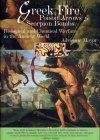
Greek Fire, Poison Arrows & Scorpion Bombs: Biological and Chemical Warfare in the Ancient World by Adrienne Mayor
Hercules was probably one of the most famous early practioners of biological weapons, and one of its most prominent victims...
Slayer of the Lemean Hydra, Hercule's dipped his deadly arrows in the Hydra's blood, creating a fatal weapon - one that echoed down through Greek history claiming myrid lives. Eventually the Fates drew him full-circle and Hercules is destroyed by the gift of a cloak from his wife. The garment, secretly poisoned with the blood of Nessus, a centaur that Hercules has shot with his envenomed arrows, "burns like fire" until Hercules, in agony, begs his own son to burn him in a bonfire.
The legendary story of the 12 Labors of Hercules serves as both metaphor and warning in Adrienne Mayor's fascinating and highly readable examination of the usage and prevelance of biological and chemical warfare in the Ancient World. Greek Fire, Poison Arrows and Scorpion Bombs is a timely and relevant eye-opener, touching on the practical usages of such tried and true weapons such as poisoned food, tainted water, bug bombs (scorpions and bees were apparently popular tools to loft onto besiging armies), snake bombs, burning oil, pestilence-ridden corpses, maddened cattle, pitch-covered pigs (ignited of course) and, of course, the precusor of modern napalm, greek fire. Of special note is the "mad honey" that Xenophon and the Ten Thousand encounter on their trek to the sea. Mixed from the rhododendron plant, the honey of Pontus is a famous and lethal toxin causing hallucinations and often death.
Mayor carefully outlines the often ambigious nature of chemical and biological weapons, particularly the fact that the ancients recognized the double-edged sword that they wielded had terrifying implications for their own populations if used unchecked. Mixing the mythological roots of bio-war with historical examples, Mayor has written a highly readable, utterly absorbing piece of work that, at the end, leaves you grimly fascinated and nervously appalled.
For some terrific information on the ancient world and such stalwarts as Hercules, check out the Perseus Project from Tufts University.
Worried about that fever? Check out the National Library of Medicine's Biological Warfare page...brrrrr. Hey, where'd that rash come from?
Damn, those guys are busy - here's their page on Chemical Warfare...damn, now there's spots with the rash...
Lastly, here's a copy of Sophocle's "Philoctetes", the tale of the man who inherited the dubious prize of Hercule's poisonous arrows...
Thanks for reading. Please post comments below. Links would be appreciated.
No comments:
Post a Comment